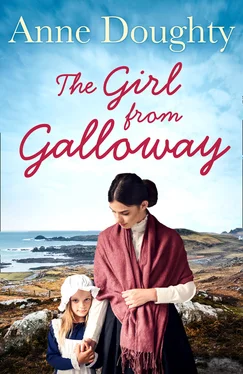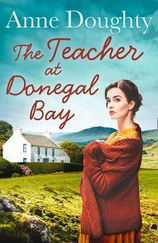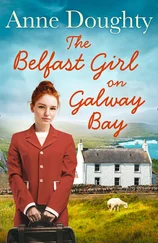*
They sat and talked as old friends do, for Daniel was one of the first people she had met when she came to Ardtur. Patrick had taken her to meet him one evening when they’d been back only a week or so. She’d found a house full of people, not one of whom she yet knew, but Daniel welcomed her warmly, made her sit beside him by the hearth and introduced her new neighbours one by one with a story about each of them, or a joke. Then he had told a long, traditional story after which he encouraged his visiting neighbours to sing, or to recite.
There followed many evenings at Daniel’s house before the children were born. When he had someone with a violin, or a penny whistle, he’d insist the young ones take the floor. Once, indeed, to please him, she had taken the floor herself with Patrick to learn ‘The Waves of Tory’.
She would never forget that evening: being passed from hand to hand by young men in shirtsleeves, dipping her head below raised arms, making an arch herself with a new partner, and all the time the lilt and dip of the music mimicking the flowing waves.
Hannah’s regular visits to Daniel were interrupted when she had her first miscarriage and then again when Patrick went back to Scotland. It was only a week after his departure when Daniel himself came to call on her. He told her that he still expected to see her, Patrick or no Patrick, whenever she could spare the time.
So she had walked up there on her own, or joined with another neighbour from Ardtur, for the long months when Patrick was away in Scotland. And so the year turned and Patrick returned. But it was only after two more miscarriages that she finally managed to carry Rose to full term. Then, there could be no more evening visits for her until Patrick was at home over the winter.
But Daniel made it clear that he was not prepared to be deprived of her company for all those long months. If she could not come to him in the evening because of little Rose, then he would come down and visit her in the afternoons. That is what he then did, almost every week.
Sometimes he brought a book and asked her to read to him, sometimes they just talked, but always he asked her about ‘home’, her father, her brothers and sisters, their lives, their travels and their families. Slowly and very intermittently, he told her something about his own unusual background and how he came to have a formal education that included Latin and Greek.
It was while Rose was still a baby that he came one afternoon to tell her of a decision he’d made. He said that since a young man who took pupils had left the adjoining townland quite unexpectedly, there was now no school anywhere nearby. He had decided that unless he did something himself, a generation of children would grow up on the mountainside who could neither read nor write. He was going to start a school and he needed her advice as well as her encouragement.
As the morning passed and the sun climbed higher, Hannah felt the warmth on her shoulders for the first time that year. Her spirits rose as, first Daniel, and then Marie, came to sit beside her on the stone bench a little way from the open door of the cottage, where the table and benches had now been rearranged and set up to serve as a schoolroom.
She was aware of the murmur of children’s voices. Like the hum of bees, it reflected the pattern of the morning’s activity, the sound oscillating but never intruding on the conversation she was having with whichever of the two teachers was sharing the stone bench with her.
It was Daniel who came first, joining her after he had conducted the roll call. She had heard him clearly as he called out the names and then less clearly as he asked his questions about the pupils who were missing. He explained later that he always asked those present about the absentees, whether they were needed at home, or on the land. If they were ill, then he wanted to know who was looking after them and whether there was any question of a doctor having to come.
Daniel’s first comments to Hannah when he joined her on the bench were on what they were trying to do with the children, encouraging them to speak out, to pay attention to other people, to ask questions and find out things for themselves. Marie, who came a little later, offered her detailed descriptions of each of the pupils, including Rose and Sam.
Hannah listened with growing interest and admiration. She was impressed by the way in which they dealt with the range of ages and abilities in the children who had come to them. There were several little girls barely five years old and some big boys already twelve. They were the ones most often absent if there were potatoes to be harvested or produce of any kind to go to market.
Daniel and Marie had managed to work out an overlapping pattern where the older children helped the younger ones and encouraged them to read aloud and recite the poems Daniel had taught them. At the same time, those who’d been present were asked to share what they’d been doing with those who’d been absent. Everyone was persuaded to talk about what they’d been doing at home, what visitors had called to see them and what answers they’d had to questions they’d been given by way of homework, things they could ask their parents, or other members of their family.
Daniel and Marie both said in their different ways, when they took their turn to talk to her, that they’d not realised to begin with how good it was for their pupils to be required to help each other in this way and what beneficial effects the shared activity had produced.
‘Shyness has little educational value,’ Daniel declared, when he sat down again after he’d taken a session on spelling. ‘These children need to be able to communicate with other people whatever their rank or status. We’re trying to develop their confidence. That way they can begin to educate themselves, however many, or few, their school years might turn out to be.
It was Marie who shared with her the surprise they’d had when they discovered Daniel’s inability to see could be turned to good purpose. Each new achievement of an individual, or a small group, was brought before Daniel, for it had emerged very early on, that once a child grasped fully that he could not see, then he or she saw for themselves the need to explain exactly what they’d done. The effort of explaining, telling him what letters, or words, they had learnt, what information they had found out at home, had meant that among other benefits there were no problems of behaviour, nor of bullying, such as might occur in a traditional school.
Hannah had to smile when Daniel referred to his own memory and what a resource it had been to him. She remembered so well when she and Patrick first visited his home on their arrival together from Scotland how amazed she had been listening to the first of the long, complicated stories he told.
Now, it seemed, Daniel used the gift to benefit each one of the pupils.
When they had to report to him on some lesson they had learnt, or information they had found out, he would respond by offering encouragement, then remind them of something else they had recently achieved. He’d continue by telling them a joke or asking a riddle. He would then ask more questions. He’d encourage their answers and if they didn’t have one, he’d ask them to go away and try to find one. They could ask other pupils if they wanted to, parents, or people they knew, or they could begin by looking up the indexes in the small selection of books they’d been given by a visiting English lady.
At one point, Daniel admitted freely that when they began their work in the schoolroom they’d been concerned his blindness would be a serious problem and put too great a burden on Marie, but they’d quickly come to see how facing the problem had actually shaped a way of working they might otherwise never have discovered.
Читать дальше












